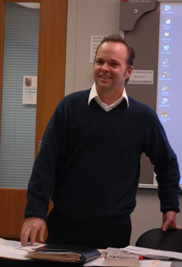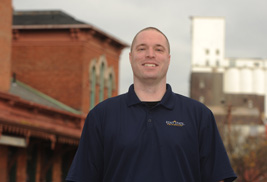Featured Article
New Community Liaison Seeks to Build Bridges Between University and Its Home
Neal Stefanko, Kent State's new University-Community Liaison is paving the way for new unity and understanding between the Kent community and Kent State University students and staff.
read moreTranslator Receives Federal Funds to Spotlight Little-Known Spanish Works
Posted Nov. 8, 2010
Translation is sometimes considered a lost art. The task of translating the same words and ideas into another language and time period can be daunting. A translator has both the original author's and his own reputation at risk every time he or she sits down with a blank sheet of paper.

Kelly Washbourne (above, and with a
translation class, front)
Dr. Kelly Washbourne, associate professor of Spanish translation in the Department of Modern and Classical Languages, looks to language as a challenge. His curiosity about other cultures and languages has earned him a $25,000 Translation Fellowship from the National Endowment for the Arts (NEA).
Out of 102 applications from scholars around the country, 20 grants were funded, only four of which were awarded the highest level of support of $25,000 each.
The NEA is a public agency devoted to supporting and bringing the arts to all Americans.
"My success comes from great mentors and colleagues," Washbourne says. "Education hasn't killed off my curiosity, and that's the number one thing that keeps me working and growing as a translator."
Washbourne is an editorial board member of Current Trends in Translation Teaching and Learning, a journal of translator training in Helsinki, Finland. He teaches the translation pedagogy seminar in the Translation Studies doctoral program in the Institute for Applied Linguistics at Kent State, the only program in the country that offers an undergraduate, master's and doctorate in translation.
Washbourne's favorite pieces to translate are those in which languages comes alive. He is drawn to works that are very language-oriented, works where "language is losing its mind, spilling over its borders."
Washbourne's grant is a critical translation, Legends of Guatemala, from the Spanish of Miguel Angel Asturias. The work will be published with the Latin American Literary Review Press in 2011.
In his proposal, he wrote that his goal is to make Legends, a "contestatory, hybrid, foundation text - aesthetically and intellectually successful with new and initiated readers alike."
Washbourne selects pieces from writers who would otherwise never be read. He said that a translator can be like a megaphone for writers who don't have a platform.
His proposal also won a National Endowment for the Humanities (NEH) Summer Stipend; one of 85 selected this past spring from 1,023 applicants nationwide. The stipend is a summer research fellowship program that provides opportunities for individuals to conduct advanced work to enhance their capacity as interpreters of and contributors to thought and knowledge in the humanities.
Washbourne has been an associate professor at Kent State for seven years. He said that in translation, multiple versions of a text may be considered valid, depending on variables such as audience. He enjoys being in a classroom where a beginner translator can come out with solutions and have a wonderful instinct.
"I love to teach because I'm a lifelong learner," says Washbourne. "I just happen to have a job teaching."
For more information about the grant programs, go to www.neh.org or www.nea.gov.
By Rebecca Mohr
